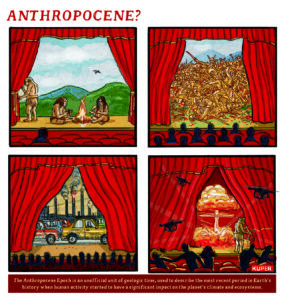AAAS: Changing Climate May Bring Irreversible Alterations
U.S. scientists have intervened in the policy debate to say the evidence that the climate is changing is as strong as that which links smoking with cancer.
By Alex Kirby, Climate News NetworkThis piece first appeared at Climate News Network.
LONDON — The American Association for the Advancement of Science (AAAS) says there is a “small but real” chance that a warming climate will cause sudden and possibly unalterable changes to the planet.
This echoes the words used in its 2007 report by the Intergovernmental Panel on Climate Change (IPCC), which said climate change might bring “abrupt and irreversible” impacts.
In a report, What We Know, the AAAS makes an infrequent foray into the climate debate. The report’s significance lies not in what it says, which covers familiar ground, but in who is saying it: the world’s largest general scientific body, and one of its most knowledgeable.
The AAAS says: “The evidence is overwhelming: levels of greenhouse gases in the atmosphere are rising. Temperatures are going up. Springs are arriving earlier. Ice sheets are melting. Sea level is rising. The patterns of rainfall and drought are changing. Heat waves are getting worse, as is extreme precipitation. The oceans are acidifying.
“The science linking human activities to climate change is analogous to the science linking smoking to lung and cardiovascular diseases. Physicians, cardiovascular scientists, public health experts and others all agree smoking causes cancer.
Few dissenters
“And this consensus among the health community has convinced most Americans that the health risks from smoking are real. A similar consensus now exists among climate scientists, a consensus that maintains climate change is happening, and human activity is the cause.”
The report’s headline messages are unambiguous. It says climate change is occurring here and now: “Based on well-established evidence, about 97% of climate scientists have concluded that human-caused climate change is happening.
“This agreement is documented not just by a single study, but by a converging stream of evidence over the past two decades from surveys of scientists, content analyses of peer-reviewed studies, and public statements issued by virtually every membership organization of experts in this field.
“We are at risk of pushing our climate system toward abrupt, unpredictable, and potentially irreversible changes with highly damaging impacts…Disturbingly, scientists do not know how much warming is required to trigger such changes to the climate system.
Expensive to delay
“The sooner we act, the lower the risk and cost. And there is much we can do…as emissions continue and warming increases, the risk increases”.
The AAAS says there is scarcely any precedent for the speed at which this is happening: “The rate of climate change now may be as fast as any extended warming period over the past 65 million years, and it is projected to accelerate in the coming decades.”
Historically rare extreme weather like once-in-a-century floods, droughts and heat waves could become almost annual occurrences, it says, and there could be large-scale collapses of the Antarctic and Greenland ice sheets, and of part of the Gulf Stream, loss of the Amazon rain forest, die-off of coral reefs, and mass extinctions.
The authors acknowledge that what the AAAS is doing is unusual: “As scientists, it is not our role to tell people what they should do or must believe about the rising threat of climate change.
“But we consider it to be our responsibility as professionals to ensure, to the best of our ability, that people understand what we know: human-caused climate change is happening…”
More child malnutrition
At the end of March the IPCC, the UN’s voice on climate science, is due to release a summary of the report of its Working Group II, on impacts, adaptation and vulnerability to climate change.
The London daily The Independent, which says it has seen a draft of the report’s final version, says it will spell out a prospect of “enormous strain, forcing mass migration, especially in Asia, and increasing the risk of violent conflict.”
The newspaper says the report predicts that climate change “will reduce median crop yields by 2% per decade for the rest of the century”, against a backdrop of rising demand set to increase by 14% per decade until 2050. “This will in turn push up malnutrition in children by about a fifth”, it adds.
Other predictions in the draft, The Independent says, include possible global aggregate economic losses of between 0.2 and 2.0%; more competition for fresh water; and by 2100 hundreds of millions of people affected by coastal flooding and displaced by land loss, mainly in Asia.
Your support matters…Independent journalism is under threat and overshadowed by heavily funded mainstream media.
You can help level the playing field. Become a member.
Your tax-deductible contribution keeps us digging beneath the headlines to give you thought-provoking, investigative reporting and analysis that unearths what's really happening- without compromise.
Give today to support our courageous, independent journalists.






You need to be a supporter to comment.
There are currently no responses to this article.
Be the first to respond.